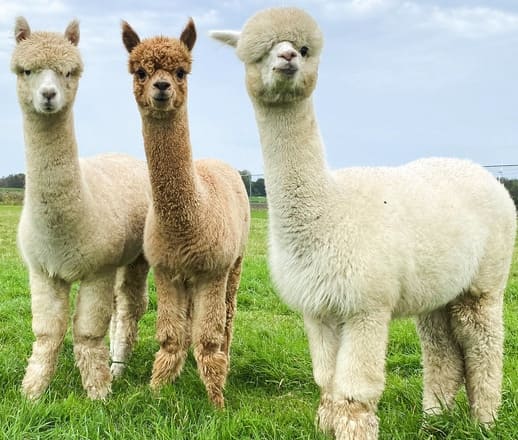
Cousins to llamas, vicunas and camels, alpacas have long been prized for the beauty and usefulness of their fleece, which comes in 22 colors. This soft, fine fleece is used to make many finished products, including socks, sweaters, and blankets.
Warmer than wool, yet as soft as cashmere, this high-end luxury product is harvested in yearly “shearings” where it is gently removed from the alpaca. Alpaca farmers will often use the shearing events as an opportunity to share the alpaca experience with newcomers; while the alpacas dance for joy after losing 5-12 pounds of dense weight, typically right in time for the hot summer!
Alpacas were generally imported from South America from 1983-1998 and the bloodlines in the U.S. consist of some of the top in the world. They are registered with their parentage confirmed by DNA samples, so there is comfort in knowing the pedigree of the alpacas. While the fleece is the main reason many people choose alpacas, alpaca breeders are also enchanted by the opportunity to grow their herd over time for the investment returns and tax benefits.
At last count, there were 100,000 registered alpacas in the United States. With a very slow reproductive cycle of 11 1/2 months, these “induced ovulators” usually begin breeding at 18-24 months and have life expectancies into the mid-teens. Vet care is typically minimal as these hearty beauties thrive in the Southeast. They are herd animals and can be very sociable. They communicate with a soft humming sound and like to “pronk” at dusk when they celebrate the end of a peaceful day by kicking up their heels and dancing through the pasture.
The Southeast is home to over a hundred alpaca farms, and you are invited to “Share the Joy” of alpacas by visiting a farm near you to see not only “the World’s Greatest Livestock Investment”, but one of the most beautiful, peaceful animals you can imagine.
The Southern Select Alpaca Show Presented by M & M Alpaca Farrm is also a great venue to experience alpacas as hundreds of alpacas arrive in Concord NC to compete in the yearly event, held at the Cabarrus Events Center the third weekend in Feb. Hosted by the Southeastern Alpaca Association,and Presented by the M & M Alpaca Farm, the show sponsors educational seminars,workshops, displays, vendors of all things alpaca, And a show competition where the animals compete in halter classes and fleece classes.